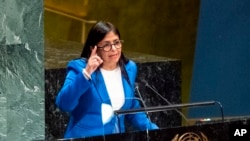Spanish opposition parties are calling for an investigation of a mysterious midnight meeting between Venezuelan Vice President Delcy Rodriguez and a senior Spanish cabinet official in Madrid’s airport last month, arguing that the session undercut Europe-wide sanctions against the Venezuelan government of President Nicolas Maduro.
Lawmakers demanded at a stormy parliamentary session Wednesday that Transport Minister Jose Luis Abalos explain what was discussed at the meeting with Rodriguez, who along with 24 other Venezuelan officials is barred from entering the European Union.
Abalos acknowledges that he arranged the brief stopover for Rodriguez when her aircraft landed in Spain on its way to Turkey on Jan. 20. The government argues that it seeks to negotiate democratic elections in Venezuela and that transit lounge meeting was designed to avoid a diplomatic incident.
“I achieved not creating a problem in the diplomatic sphere with a government with which we want to have elections without coups,” said Abalos, echoing Spanish Prime Minister Pedro Sanchez’s repeated calls for elections in Venezuela “as soon as possible.”
EU sanctions violated
However, Eliot Abrams, the U.S. State Department’s special envoy for Venezuela, told the Spanish newspaper ABC that the meeting did violate the EU sanctions, which bar leading Venezuelan officials from entering EU territory including its air space. He called for the Spanish media and Congress to investigate the Madrid stopover.
Since word of the airport meeting was first leaked to the media by sources in the Spanish police, Abalos has offered shifting explanations of the encounter. After first saying that the meeting consisted of only a casual greeting, he later admitted they had talked for 20 minutes on board her airplane.
Second meeting held
Spanish news outlets have since reported that Abados and Rodriguez held a second meeting for an hour in the airport’s VIP lounge.
The incident has heightened suspicion among Spain’s conservative opposition that the Socialist-led government is backing away from its previous support for Venezuela’s democratic opposition.
Sanchez was among the first European leaders to recognize opposition leader Juan Guaido as the interim president of Venezuela, but he has since formed a new coalition that relies on the support of the far-left Podemos party, which has longstanding ties to Maduro.
Sanchez notably failed to meet with Guaido during a tour of Europe last month by the Venezuelan National Assembly president, who is recognized as interim president by the United States and more than 60 other countries. Guaido did secure meetings with the leaders of Britain, France, Germany and other nations.
'Motives' questioned
The apparent snub, which was blamed on a scheduling conflict, prompted a subtle rebuke from the United States. "We don’t know the motives of [Prime Minister] Sanchez, but urge chiefs of government to meet with the interim president to know firsthand what happens on the ground," said Carrie Filipetti, the U.S. deputy assistant secretary of State for Cuba and Venezuela.
Despite that concern, U.S. President Donald Trump praised the “close friendship and shared history” between the United States and Spain this week in announcing a coming state visit to Washington by Spain’s King Felipe and his wife.




